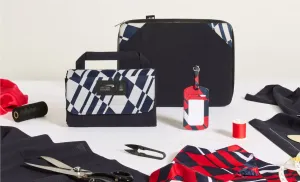Caring for your Clothes: How to Fight Fast Fashion
Caring For Your Clothes & the Planet
Buy less, wear more – the motto that is taking the fashion world by storm, as we are encouraged to cut down on our consumption of fast fashion, and give the clothes that we already own some love. The planet-damaging effects of the fast-fashion industry have been brought to the attention of many, and people are therefore looking for new ways to repurpose existing items in their wardrobes. Re-wearing your clothes may be better for the environment, but it can be extremely annoying when your favourite t-shirt gets washed a few too many times, and comes out covered in bobbles, a far cry from the wardrobe staple it once was when you first bought it. However we are constantly looking for new ways to help you, help the environment, and one way in which you can preserve the current contents of your wardrobe for a little while longer, eliminating the need to rush to the high street to buy a planet-damaging £6 jumper, is by caring for your pre-existing clothes.
These ten essential tips will help you to keep your wardrobe fresh, fabulous, and timeless for years to come.
- Wash less frequently
We aren’t suggesting that you wear dirty clothes, no one wants to turn up to work with the remnants of last week’s dinner down their shirt, but constantly soaking and spinning fabrics will mean that they wear out a lot quicker. Especially with items like jeans, just spot clean; hang out to air before putting them back in your wardrobe ready to wear again. - Wash at a lower temperature
Washing at a lower temperature is not only better for your clothes; it will also help your bank balance, and save the planet. Lower temperatures stop your clothes from shrinking or losing their colour, it saves electricity and therefore money, and by using less electricity you are therefore helping to reduce your carbon footprint and in turn contribute to saving the planet. - Pay attention to care labels
When you do wash your clothes, pay attention to the care labels, as this will help wash the fabric in the most appropriate way. - Use garment storage bags
If you are a working professional, or just need to make frequent trips to a dry cleaners, you may own quite a few clothes that are still hung up in their plastic dry cleaning bags. However, these plastic bags can trap moisture and the chemicals from the cleaning process, instead remove from the plastic, and allow your clothes to “breathe”. - Invest in a clothes shaver
In the winter time, we are all a big fan of a chunky knit, however knits have an unfortunate habit of becoming bobbly over time. By investing in a clothes shaver, you can neatly remove the bobbles which will ensure your knits stay fresh for many more winters to come. - Make sure your hangers are up to standard
Hangers may not be something that you have put much thought into. Perhaps they are just the plastic ones that you get given when you buy a new dress in H&M. However, plastic hangers can actually stretch the shoulders of your clothes, so invest in wooden or padded ones to prevent this from happening. - Wash your dark clothes inside out
Washing your dark clothes inside out with help prevent colour running or fading, and will mean that they remain vibrant for longer. - Keep the moths away
Moths can wreak havoc in your wardrobe if you’re not careful, so protect our clothes from these little critters with cedar balls or lavender scented sachets. - Store for each season
Separating your clothes into seasonal capsule wardrobes and storing them correctly when they aren’t in use will ensure that your wardrobe is not jam packed, leaving space for your clothes to hang neatly and breathe. - Repair any damage
By repairing any holes, tears or loose threads as soon as they appear, you eliminate the risk of them becoming bigger over time, and this means that you can carry on wearing the garment for years to come.
By following these 10 simple steps, you can extend the lifetime of your clothes, which means you can buy less, wear more, and help to save the planet from the negative effects of the fast fashion industry.
Bags of EthicsTM




